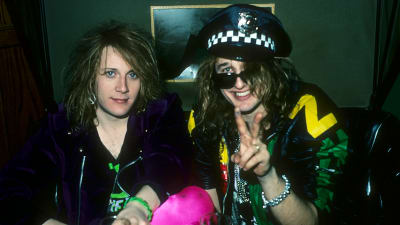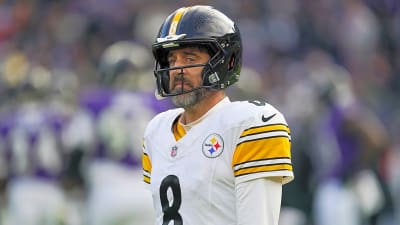
When it's complicated: Loving Michael Vick
It’s overtime in Minnesota. It’s 2nd-and-8 on Minnesota’s 46-yard line, and Michael Vick takes the snap from under center. There is a play-action to running back T.J. Duckett, who is filling in for the injured-in-the-second-quarter Warrick Dunn. The play action fools no Vikings defenders. Vick is looking right as he completes his five-step drop. As soon as his foot is planted on that fifth step, Vick is flushed out of the pocket by linebacker Nick Rogers. Rogers, who is quick up the line with a bull rush on the left tackle, is unable to keep contain on Vick, who calmly pops out of the pocket to his left, forcing Rogers to take one of an infinite number of angles on the scrambling Vick, all of which would prove to be uncomfortably impossible for any man with Rogers' speed looking to catch a man with Vick’s.
As Vick crosses the line of scrimmage, chaos ensues for approximately seven seconds. He moves through four layers of Vikings defenders, including a linebacker and defensive back who both converge on what they believe will be the Falcons running back at the exact same moment, tackling each other instead of Vick, who would reach the end zone 21 more yards down the field. Instead of an extended celebration, Vick just continues to run to the tunnel and off of the playing field as if to say, "I won’t be touched, even when the game is over.” The 46-yard touchdown is the perfect cap on an eight-game win streak in the middle of the 2002 season.
Moreover, this single play perfectly captures the essence of Vick’s unique skill set. On the day, Vick broke the record for rushing yards in a game by a quarterback by 46 yards, which just happened to be the distance traveled on that game-winning run. He didn’t have his best game on the day. He fumbled twice and threw an interception, but despite his struggles, we were seeing the beginning of a new signal-calling archetype: a hyper-athletic quarterback with the arm strength of a grenade launcher. At his best, Vick was nearly impossible to game plan against. At his worst, he was still the most electrifying man in football.
Falcons-era Vick will go down as one of those players who will be impossible to forget. He was the epitome of cool in a league that lacked the ability to export culture in a way that NBA does on a constant basis. Vick was the NFL’s Allen Iverson in the blackest city in the South. He made the Falcons matter despite his best wide receiver for those six years being Alge Crumpler. Vick was the antithesis to what America wanted out of its quarterback. He was the blues in a nation that wanted country. All of the elements were essentially the same; he just replaced twang with soul and was unapologetic about it.
Vick’s on-the-field identity was rooted in his otherworldly athleticism, and his off-the-field identity was rooted in his blackness — and the latter of that duality would play a factor in how we all view his legacy and the meaning of his absence from the NFL.
Michael Vick never came off as an inherently bad person, but he was as flawed as any other man. It’s difficult to understate how horrible a crime it is not just to train dogs to fight, but to kill them for not performing well in said fights. However, it’s just as difficult to overstate how unfairly this crime was treated against some of the things other NFL players have committed while receiving a fraction of the attention Vick received. Eric Naposki and Aaron Hernandez killed people, Ray Lewis was on trial for murder, while Marvin Harrison was implicated in a shootout. Domestic abuse, child abuse, manslaughter and the insane number of drug charges beyond marijuana are among the myriad crimes committed by other players that are equal to or worse than what Vick did, but no one, even convicted murderers, received the vitriol that Vick received for bankrolling a dogfighting ring.
Two very specific variables are at play here. Vick played the most prestigious position in all of sports, and he did so as a black man. While we cannot ignore the crimes by any means, we cannot ignore why the crimes were dealt with so harshly, especially by the NFL. Vick didn’t just commit a heinous crime, but he did it at the peak of his abilities to challenge institutionalized ideologies of positional prestige. New offenses were being developed to take advantage of quarterbacks with his particular skill set, and new defenses were formed to stop these very changes. Vick was changing football, and for some, he was changing it for the worse. The pocket was losing cachet, and to those with no imagination, so were white NFL quarterbacks.
In the midst of it all, everything about Vick’s absence from the NFL was wrong. Vick was wrong for putting himself in the position to be arrested for a federal offense. The NFL was wrong for making it so difficult for him to come back. We were wrong for our collective treatment of him as a person. We don’t like when mistakes make us uncomfortable, and there are few discussions more uncomfortable to middle America than tortured dogs because middle America doesn’t know how to talk about that without the pretense of anger. It’s not a crime that, depending on where you come from, you see or even hear about on a regular basis, and that might have been Vick’s biggest mistake. Regardless, he made an awful mistake, but that mistake never made him an inherently bad person. And this is what made his return, at least for some of us, so much fun.
There are few things in the NFL better than teams running up the score against rivals for the pettiest of reasons. It’s Nov. 15, 2010, Michael Vick’s first year as a full-time starter after serving a prison sentence for bankrolling a dogfighting ring, and the Philadelphia Eagles need a win to keep pace with the first-place New York Giants. Across the field is Donovan McNabb, the ex-Eagles quarterback who told reporters, "Everybody makes mistakes in their lifetime, and they made one last year," in a question about the Eagles letting their star quarterback go. Just hours before the game, McNabb would sign a five-year, $78 million extension with Washington with $40 million of that guaranteed. McNabb’s comments or financial gain didn’t mean much once the game started.
On the first play from scrimmage, Vick took the snap, and from the left hash mark, he hit a streaking DeSean Jackson on the right side of the field for an 88-yard touchdown to get things started — in Washington no less. The throw was as impressive as the whole afternoon. A cross-field throw to hit, at the time, one of the three fastest wide receivers in the NFL in stride on the first play from scrimmage? Vick would throw three more touchdowns and rush for two more in the 59-28 rout of the professional football team in the nation’s capital. Per ESPN, “Vick became the first player in NFL history with at least 300 yards passing, 50 yards rushing, four passing touchdowns and two rushing touchdowns in a game.”
When we discuss things like legacy, Vick’s numbers are almost rendered meaningless because the visual stimulus he left behind was more than enough for us to fall in love with his game over and over again. Vick didn’t have the postseason success of some of the NFL’s great quarterbacks, but he persevered through one of the most mutually traumatic circumstances between player and world we’ve ever seen. Young Vick was this prolific, paradigm-shifting football player. Post-legal Vick was a validation of the Young Vick the NFL tried to get us to forget, and that validation moved beyond just Vick on the field.
Since Vick’s prime years, we’ve seen an influx of black quarterbacks starting on NFL teams, so much so that before Super Bowl LI, a black quarterback had started in each of the previous four Super Bowls with a ridiculous goal-line call preventing them from winning at least half. Vick’s influence is all over this trend, and with four of the last seven Heisman Trophy winners being black quarterbacks (five of seven being quarterbacks of color with Marcus Mariota), that trend isn’t likely to slow anytime soon.
Michael Vick will never play professional football again, and that’s OK. He gave us a new brand of excitement, a future to build upon. His candidacy for the Hall of Fame may never come to fruition, but he’ll forever live in the canon of those who shattered the status quo. He may never be enshrined, but he’ll never be forgotten.
More must-reads:
- Michael Vick pens heartfelt letter, says he’ll always be a Falcon ‘in my heart’
- Vick believes he deserves spot in Hall of Fame
- The 'Atlanta Falcons career rushing leaders' quiz
Breaking News
Trending News
Customize Your Newsletter
 +
+
Get the latest news and rumors, customized to your favorite sports and teams. Emailed daily. Always free!








